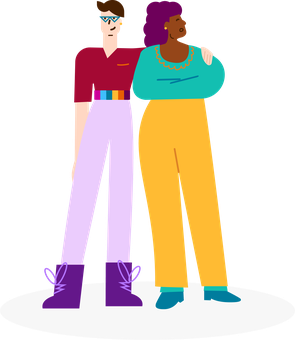Trans awareness week allows for a time of reflection, celebration and to come together to raise awareness and highlight the issues faced by trans, non-binary and gender diverse people. This week gives us an opportunity to give a platform to the lives of trans people and learn about what it means to be trans.
Key facts:
- 25% of trans people have experienced homelessness at some point in their lives.
- Research indicates that discrimination is a significant factor as to why so many trans people find themselves in this position.
- 25% were also discriminated against when looking for a house or flat to rent or buy in the last year.
- Nearly half (46 per cent) of trans young people said that being homeless had a negative impact on them staying in their job or searching for a job.
- Almost two-thirds of trans young people said that being homeless had a negative impact on their physical health.
- Over two-thirds of trans young people said that homelessness made it hard to establish or maintain new relationships, including friendships.
- Only 31 per cent of trans young people who did access support whilst experiencing homelessness felt that staff understood the reasons for why they became homeless. 43 per cent of young trans people who accessed support from a local authority or charity when homeless said they had experienced discrimination or harassment due to being trans.
- More than 1 in 3 trans people have been bullied and/or harassed at work.
Trans-inclusive workplaces have the power to positively change these statistics, which is something worth taking action for. Transphobia often stems from ignorance, so it is important to be an active ally for the trans community. There are many ways in which you can make your workplace trans inclusive and be a trans ally. You can educate yourself, listen to and respect boundaries of all colleagues, as well as those who are trans.
Pronouns
Pronouns are a form of self-expression and allows people to define themselves on their own terms. By simply adding your pronouns in your email signature and workplace communications software you can actively make your workplace culture more inclusive, as well as opening the conversation about gender pronouns and their importance. We must remember that some of the LGBTQIA+ community may not be comfortable with sharing their pronouns at this point, so if you feel comfortable doing so you will allow for a safe and inclusive environment for others to do the same.
It is important to note that someone’s pronouns do not correlate their gender identity, and any person of any identity is entitled to use any set of pronouns for their own personal identity. For example, a non-binary person may use she/her pronouns.
It’s also good practice to adopt gender neutral language. For example, “good morning everyone” as opposed to “good morning ladies.”
In some cases, you may make a mistake without realising. If someone corrects you, thank them, apologise and learn from this mistake. We must acknowledge that we are all still learning/unlearning cisnormativity and this helps to destigmatise it. It’s always best to not assume someone’s gender identity, and if in doubt, respectfully ask someone what their pronouns are if you are unsure.
Educate yourself, challenge transphobia, include trans colleagues, listen, respect boundaries
Recent work we’ve produced:
How homeless services can be more inclusive and support young trans people

